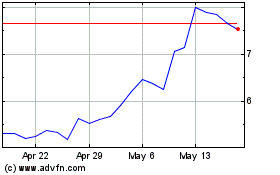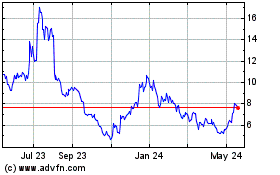Homebuyers With Kids Are Twice as Likely to Get Family Help for Down Payments Than Those Without Kids
20 December 2024 - 12:30AM
Business Wire
Homeowners with kids living under their roof
are much more likely to receive help from family with down payments
and/or monthly mortgages than their no-kids counterparts, according
to a recent Redfin-commissioned survey. That’s partly because
they’re buying bigger, more expensive homes.
(NASDAQ: RDFN) — One-quarter (25%) of recent homebuyers who have
kids living at home received a cash gift from family to help fund
their down payment, more than double the 12% of recent buyers
without kids who received such a gift, according to a new survey
from Redfin (redfin.com), the technology-powered real estate
brokerage.
Homeowners with kids living under their roof are also more
likely to receive family help for mortgage payments. One in six
(17%) homeowners with kids report receiving financial support from
family to help pay their mortgage, compared to 8% of those without
kids. And 11% of homeowners with kids have used inheritance money
to pay their mortgage, versus 7% of those without kids.
Receiving family money is just one way people reported paying
their housing expenses. Redfin also asked respondents about a
number of other methods people commonly use to pay their mortgage.
Homeowners with kids at home were more likely than those without
kids to use nearly every method listed; that list can be found in
the full report. They’re twice as likely to work a side hustle (23%
vs. 12%), and nearly twice as likely to pull money out of
retirement funds early (14% vs. 9%).
U.S. housing costs have risen more than 40% since before the
pandemic, with soaring home prices and mortgage rates making it
difficult for many people—with or without kids—to afford a home.
Half of homeowners with kids struggle to afford their housing
payments, according to the survey. Homeowners without kids are
roughly equally as likely to struggle.
There are several reasons people with kids may be more likely
to receive help from family with their down payments and/or
mortgage payments:
- People with kids are more likely to buy larger homes with
more features and neighborhood amenities, which cost more
money. 68% of respondents with kids said indoor space is a
“must have” they’d be unwilling to trade off for affordability,
compared to 60% of those without kids. In fact, people with kids
were more likely than people without kids to rate each of the 19
features we asked about as a “must have.” That includes things like
proximity to highly rated schools and grocery stores, space to work
from home and homeschool children, and low climate risk. It’s worth
noting that people with kids tend to earn more money, which could
be one reason they have bigger lists of must-haves. Roughly
two-thirds (65%) of respondents with kids earn $50,000 or more,
compared to 42% of those without kids.
- Parents may be more likely to provide financial help when it
benefits both their children and grandchildren. Redfin Chief
Economist Daryl Fairweather said it makes sense that parents are
more likely to help their kids pay for housing when doing so also
provides their grandchildren with a safe, secure place to live.
They are helping multiple family members, including children who
have no economic means to better their housing situation,
Fairweather said.
- Homeowners with kids under their roof tend to be younger
than those without. Nearly 7 in 10 (67%) of respondents with
kids are Gen Zers or millennials, compared to 25% of respondents
without kids. Younger people are probably more likely to ask
for—and receive—help from their parents.
Redfin agents also report that multi-generational homes are
becoming more common as it gets more expensive to buy homes. The
financial help can go both ways: Older parents helping their grown
children and/or adult children helping their parents.
“Monthly costs are so high these days that I’m trying to find
big homes for a lot of multi-generational families,” said Julie
Zubiate, a Redfin Premier agent in the Bay Area. “A lot of clients
who work in tech are looking for homes with ADUs so their older
parents can move in, or maybe it’s a Gen Xer looking for a home
that’s big enough for their early-20s kids to live in.”
These survey findings are from a Redfin-commissioned survey
conducted by Ipsos in September 2024, fielded to 1,802 U.S.
residents aged 18-65. The analysis of these results compares
respondents who have children under 18 living in their home to
respondents who don’t.
To view the full report, including additional survey results and
methodology, please visit:
https://www.redfin.com/news/homebuyers-kids-family-help-survey/
About Redfin
Redfin (www.redfin.com) is a technology-powered real estate
company. We help people find a place to live with brokerage,
rentals, lending, and title insurance services. We run the
country's #1 real estate brokerage site. Our customers can save
thousands in fees while working with a top agent. Our home-buying
customers see homes first with on-demand tours, and our lending and
title services help them close quickly. Our rentals business
empowers millions nationwide to find apartments and houses for
rent. Since launching in 2006, we've saved customers more than $1.6
billion in commissions. We serve approximately 100 markets across
the U.S. and Canada and employ over 4,000 people.
Redfin’s subsidiaries and affiliated brands include: Bay Equity
Home Loans®, Rent.™, Apartment Guide®, Title Forward® and
WalkScore®.
For more information or to contact a local Redfin real estate
agent, visit www.redfin.com. To learn about housing market trends
and download data, visit the Redfin Data Center. To be added to
Redfin's press release distribution list, email press@redfin.com.
To view Redfin's press center, click here.
View source
version on businesswire.com: https://www.businesswire.com/news/home/20241219581532/en/
Contact Redfin Redfin Journalist Services: Isabelle Novak
press@redfin.com
Redfin (NASDAQ:RDFN)
Historical Stock Chart
From Dec 2024 to Jan 2025

Redfin (NASDAQ:RDFN)
Historical Stock Chart
From Jan 2024 to Jan 2025
